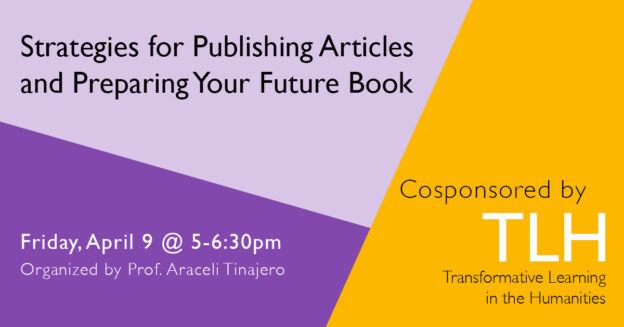Strategies for Publishing Articles and Preparing your Future Book was a workshop led by Prof. Araceli Tinajero (The City College of NY) on April 9, 2021, from 5:00 to 6:30 pm. The event was sponsored by Transformative Learning in the Humanities. Graduate students and an Assistant Professor were present. I had encouraged the participants to hand in a 150-word abstract (or summary) of the paper, dissertation, or collection that they would like to publish so they could share it with other audience members. No one brought their abstract/summary; however, when the attendees were in the breakout rooms, they carried out very interesting discussions.
The workshop was aimed to provide basic examples. Since I am a professor of literature, I furnished examples of how to begin publishing in the Humanities (I gave examples of journals at CUNY). Below is the outline of what I presented. We had excellent discussions and promised to follow up via email to continue the dialogue.
Transforming papers into articles:
- If you don’t want your professor’s advice, find a professor outside your college and have her/him read your paper.
- If you are still not convinced, ask a friend you can trust.
- Don’t be afraid of criticism.
- Remember, you don’t have to change everything the reader asks you to change.
- You can combine 2 papers: one from one class with another from another class.
Preparing your abstract or summary:
- Be coherent and clear. Imagine that your reader doesn’t know anything about your topic. Even your theoretical framework has to be clear.
Publishing articles:
Stop! Before you send a paper to be considered, you must be familiar with the journal. Example: Ciberletras http://www.lehman.cuny.edu/ciberletras
- Your professors are the experts in their field. Ask them for a list of peer-reviewed journals.
- When an author submits an article, the editors of the peer-reviewed journal will contact two readers experts in the field. Each reader will evaluate your article. The editor will get back to you with suggested revisions or, if the readers reject your paper, you have to approach another journal.
- Not ready to publish in a peer-reviewed journal? There are several prestigious journals and magazines. Many are published by university departments:
Fiction – English department @ CCNY:
Fiction – Facebook
Promethean – Facebook
On-line Journals:
-
- Cervantes– Official journal of the Cervantes Society of America
- CiberLetras– Journal of literary criticism and culture
- Dieciocho– Eighteenth-century studies in Spain and Latin America
- Espéculo– Electronic journal of literary studies
- Enclave– Journal dedicated to sharing the work of Spanish literary work from CUNY and New York.
- Hispanista– Primera revista electrónica de los hispanistas de Brazil.
- Laberinto– Spanish and Spanish-American texts from the early modern period, 1450-1750
- Lemir– Journal dedicated to Spanish Medieval and Renaissance Literature
- LLJournal– Journal of the Students of The Ph.D. Program in Hispanic & Luso-Brazilian Literatures and Languages, The Graduate Center
- Not ready to publish an article? Try writing a book review.
Publishing your dissertation:
- Think big & plan ahead. This book is a must
- You must focus. Don’t compromise with anything that is outside of the topic that you are writing.
- Again, ask your professors about the publishers.
- Study the publications, the editorial board, and their expectations.University presses = demanding and can be slowYou can find a list of academic publishers here: https://humanitiesjournals.fandom.com/wiki/university_presses_/academic_publishers
- Study thoroughly the guidelines and submit them on time
Publishing a book outside your discipline:
- Look for the experts on your campus or approach professors from other institutions.
- For example, I want to write a biography…. do you know that there is a biography and memoir program at the graduate center? The experts are there. Ask them.
- Do you want to write children’s books? Get in touch with the English department and ask the chair if someone is teaching about children’s literature. Get in touch with the professor.


